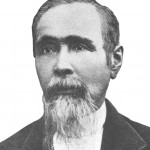In 1871 Frances Marie Antoinette Mack married Fayette Washington Roe. Both had been raised in upstate New York, though Faye (as he was known) was born in Virginia. The wedding occurred immediately after his graduation from West Point, and they quickly left to travel to his first army assignment in Fort Lyon, Colorado far from their quiet upstate homes. 
Kit Carson, Colorado Territory, October, 1871.
Tis late, so this can be only a note to tell you that we arrived here safely, and will take the stage for Fort Lyon to-morrow morning at six o’clock. I am thankful enough that our stay is short at this terrible place, where one feels there is danger of being murdered any minute. Not one woman have I seen here, but there are men – any number of dreadful-looking men – each one armed with big pistols, and leather belts full of cartridges.
Here she begins a series of letters that will later be collected and published as Army Letters from an Officer’s Wife, 1871-1888. Frances followed her husband to posts throughout the West from busy, established garrisons to small redoubts with dirt floors, and provides a detailed description of life in the frontier army from a woman’s point of view.
She describes their first home at Ft. Lyon, her lessons in riding and shooting, and her confusion with military protocol and customs. She enjoys the outdoor activities and the social life at the fort and throws herself into creating her first home. It is a rude shock when her husband’s company is transferred for the first time and she learns that their destination is Camp Supply in what is now northern Oklahoma – more isolated, more primitive, and surrounded by hostile tribes. As the wife of a junior officer she must leave behind many of her household goods, her furniture, her horse, and her new greyhound puppy. She reacts as many very young wives might have, but soon finds her feet. 
I have cried and cried over all these things until I am simply hideous, but I have to go just the same, and I have made up my mind never again to make myself so wholly disagreeable about a move, no matter where we may have to go. I happened to recall yesterday what grandmother said to me when saying good-by: “It is a dreadful thing not to become a woman when one ceases to be a girl!” I am no longer a girl, I suppose, so I must try to be a woman, as there seems to be nothing in between.
(Also, when the company stops the first night and several soldiers are sent back for forgotten supplies, she manages to convince one of them to bring her puppy as well. “Hal” grows and spends the rest of his adventurous life with Frances.)
Frances is a woman of her time, full of both courage and prejudice, who undertakes a strenuous and demanding life for the sake of her husband. She endures sandstorms, Indian attacks, floods, killing cold and countless moves. She also bakes fruitcakes, hunts buffalo and organizes cotillions. It turns out that army life suits her very well.
Read her account online in the Classics in Washington History under “Women’s Stories.”






 Historical Newspapers in Washington
Historical Newspapers in Washington

 The son of a Hudson’s Bay factor and Raven, the daughter of Chief Comcomly of the Chinooks, Ranald MacDonald grew up on trading posts in the Northwest. Fascinated by the idea of visiting Japan since his youth, he conceived the plan of shipping out on a whaling vessel and marooning himself on the Japanese shore. Despite the fact that the government of Japan threatened death or imprisonment to foreigners trying to enter the kingdom, he did just that in 1848.
The son of a Hudson’s Bay factor and Raven, the daughter of Chief Comcomly of the Chinooks, Ranald MacDonald grew up on trading posts in the Northwest. Fascinated by the idea of visiting Japan since his youth, he conceived the plan of shipping out on a whaling vessel and marooning himself on the Japanese shore. Despite the fact that the government of Japan threatened death or imprisonment to foreigners trying to enter the kingdom, he did just that in 1848.


 “One day it was more than I could enjoy. The wind roared so loud, and the sound of the waves was so heavy, that I retreated to my berth and lay down; but I could not keep my mind off the thought of how deep the water was under us. After awhile I went on deck and sat there again, and the vessel began to plunge so that it seemed as if it were trying to stand upon one end. I felt so frightened that I thought I would try to speak with the captain, and ask him if he ever knew a lumber vessel to tip over; and if I dared I would suggest that he should carry a little less sail…
“One day it was more than I could enjoy. The wind roared so loud, and the sound of the waves was so heavy, that I retreated to my berth and lay down; but I could not keep my mind off the thought of how deep the water was under us. After awhile I went on deck and sat there again, and the vessel began to plunge so that it seemed as if it were trying to stand upon one end. I felt so frightened that I thought I would try to speak with the captain, and ask him if he ever knew a lumber vessel to tip over; and if I dared I would suggest that he should carry a little less sail…